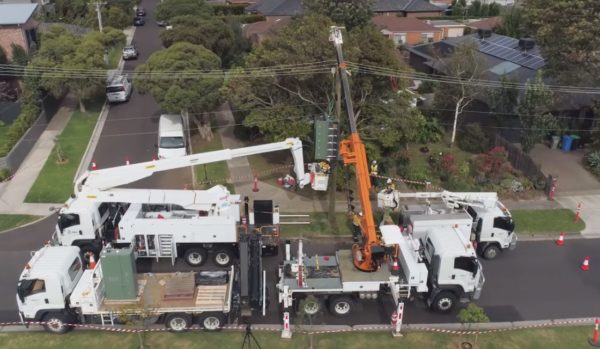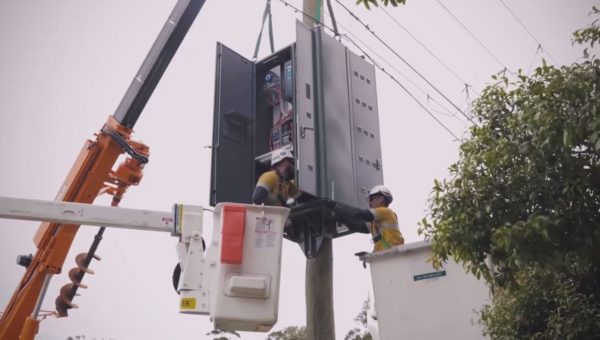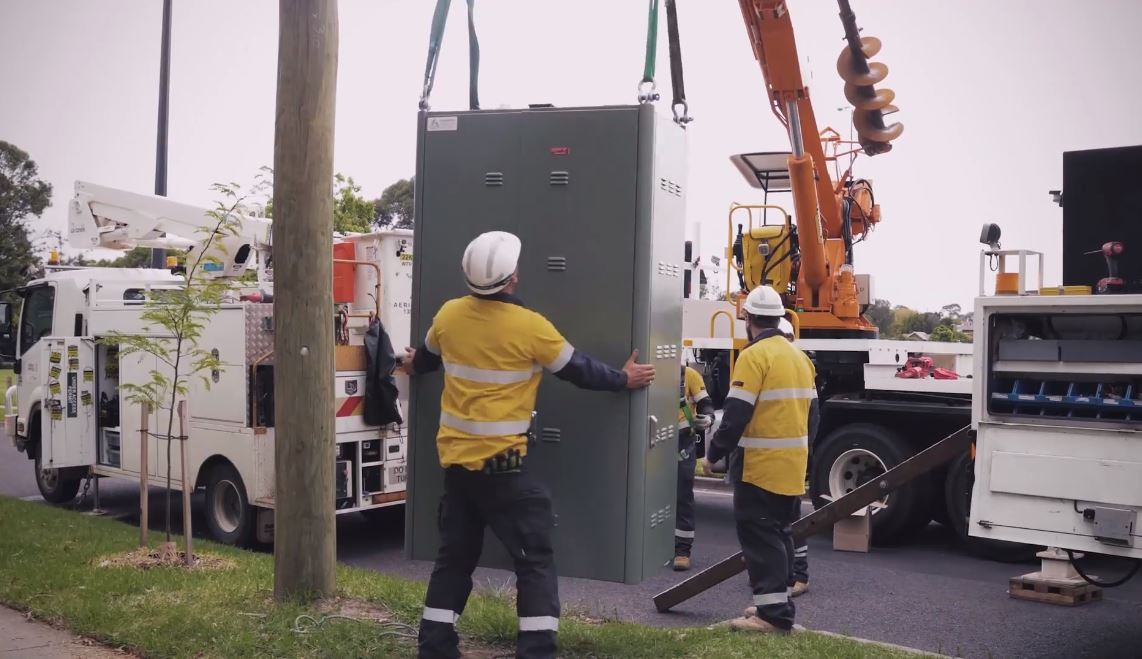Electricity distributor United Energy will install a combined 1.2 MW/2.7 MWh fleet of pole-mounted batteries across Melbourne’s southeast to facilitate greater rooftop solar PV exports and improve grid reliability in areas where the low-voltage distribution network is constrained.
United Energy, which services 660,000 customers across Melbourne’s east, southeast and the nearby Mornington Peninsula, said the 30 kW/66 kWh batteries will be mounted to electricity poles at strategic locations across its distribution network.
Each of the batteries, to be manufactured by Melbourne-based Thycon, will have the capacity to support up to 75 homes in the immediate vicinity. When the rollout is complete, the battery fleet will be able to store the electricity needed to support 3,000 homes.
Each battery will be charged during off-peak periods or when local rooftop solar systems are exporting into the network and will discharge electricity during peak periods and solar systems are no longer generating.
United Energy general manager electricity networks Mark Clarke said in addition to reducing stress on local network in times of peak demand, the batteries will also be able to regulate voltage and increase the hosting capacity of solar PV in the local grid.
“It is an important step forward in setting up the kind of flexible network we need to manage electricity exports from rooftop solar and other private generators in the future,” he said.
Clarke said the pole-top batteries, the design of which mirrors the existing distribution transformers that are already mounted to poles across United Energy’s Melbourne network, will provide an opportunity for everyone to access renewable energy, whether they have rooftop solar or not.
“A community battery is a way of storing energy that can then be used locally when it is needed,” he said.
“It is a great way of ensuring solar PV exports from homes in the community are consumed locally.
“From a network perspective, it also helps defer traditional investment so can save money for customers on future network tariffs.”

Image: United Energy
Clarke said the batteries will operate as a virtual power plant (VPP), providing demand management services and increasing hosting capacity for rooftop solar.
United Energy has signed a deal with retailer Simply Energy for the market trading rights of the VPP.
When the batteries are not required by United Energy, Simply Energy will operate them to provide wholesale power and frequency control ancillary services (FCAS).
Simply Energy CEO Shannon Hyde said the batteries presented enormous opportunities for customers in Melbourne’s south-east.
“The program shows the versatility of battery technology in supporting networks, creating opportunities to trade energy and delivering for solar and non-solar energy customers alike,” he said.
The battery rollout has secured financial backing from the Australian Renewable Energy Agency (ARENA), which will provide a $4 million grant in support of the project.
ARENA chief executive Darren Miller said distribution connected batteries has enormous potential to facilitate increased levels of rooftop solar while minimising costs.
“As more and more renewable generation comes online, it’s crucial to address the challenges of a changing energy mix and build the grid of the future,” he said.
“We’re excited to see United Energy trial a novel approach to battery storage that provides benefits to current and future solar customers and reduces network costs, while also increasing the level of dispatchable generation in the power system.”

Image: United Energy
The large-scale battery rollout follows a successful two-battery trial last year in Melbourne’s Bayside area.
United Energy expects to install and commission the first three batteries later this year.
Meanwhile, the Victorian government has awarded $3.68 million in grants to jumpstart the roll-out of neighbourhood-scale batteries and energy storage studies to maximise benefits of solar for households, businesses and community organisations.
State Energy Minister Lily D’Ambrosio on Friday announced 16 groups have secured grants as part of the Neighbourhood Battery Initiative which is funding pilots and demonstrations of a range of neighbourhood battery ownership and operational models to unlock the potential of neighbourhood-scale energy storage.
“Neighbourhood batteries are an important part of our transition to renewable energy,” she said.
“They can soak up energy from household solar and allow for the whole community to benefit from this clean energy.”
Successful groups include:
- Yarra Energy Foundation – $800,000 for construction of a neighbourhood ‘solar sponge’ battery in Fitzroy North.
- Geelong Sustainability Group – $150,000 to determine the feasibility of establishing a series of neighbourhood batteries across Geelong to help residents to store their excess solar energy.
- Energy Innovation Co-operative – $150,000 to investigate how neighbourhood batteries could support Phillip Island achieving 100% renewable energy and becoming carbon neutral by 2030.
This content is protected by copyright and may not be reused. If you want to cooperate with us and would like to reuse some of our content, please contact: editors@pv-magazine.com.









Thank you sir for dedicating us. I ambition to become pv and battery expert
I live in the South Eastern Suburb of Melbourne and interested in the Community Battery Program. I already have a 10 KWh Solar System ont roof, but no Bateries.
Are you providing a community battery to hastings Victoria as this is a low socio-economic area that would really benefit from reduced energy prices?